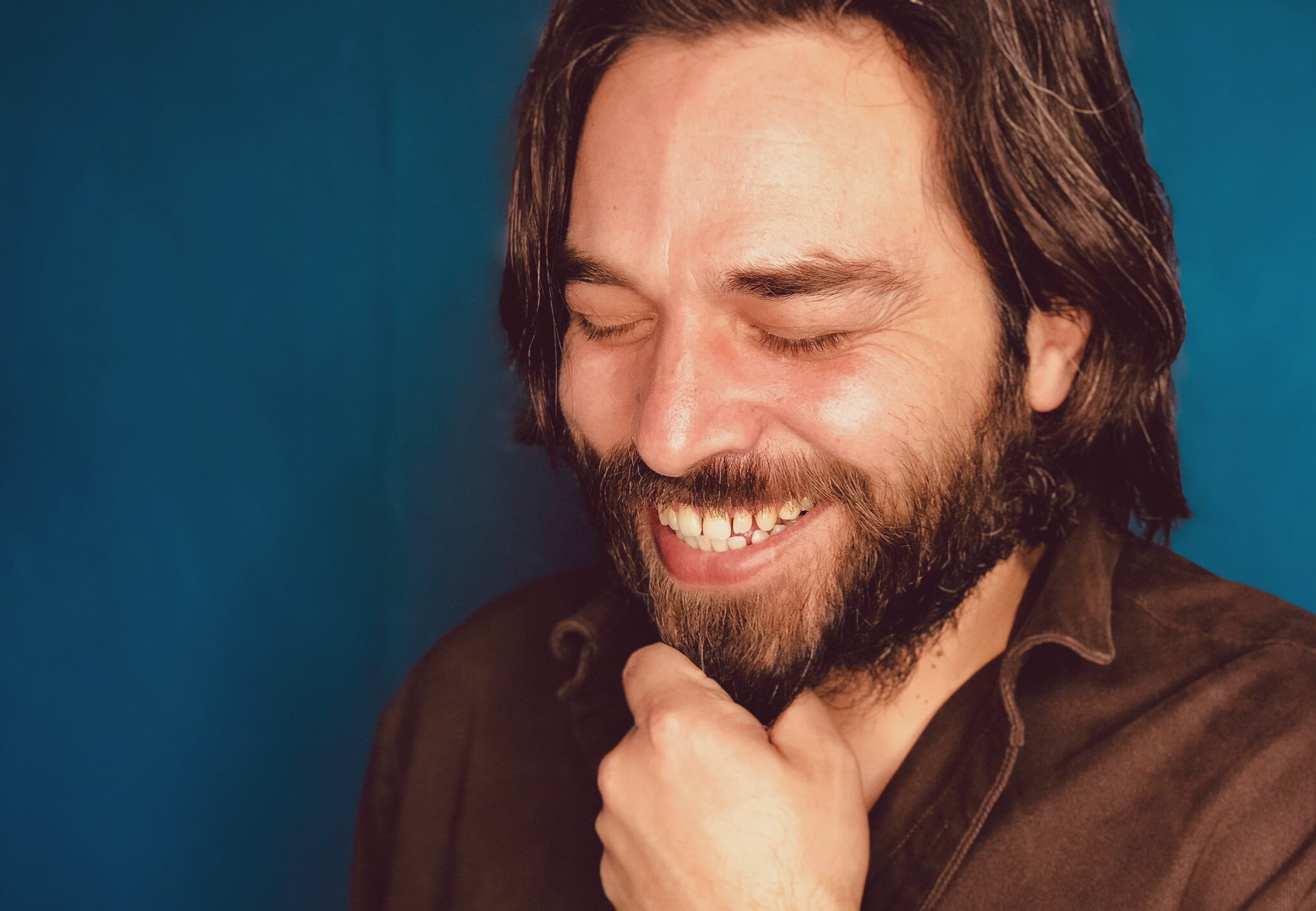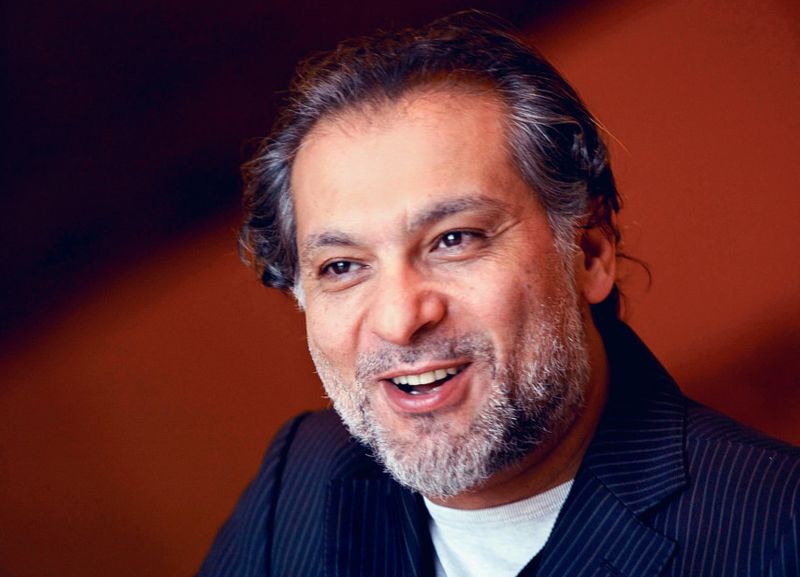
Can you talk about your upbringing and connection to acting?
I grew up in Al Tabqah. It’s a new city built near a dam, which the Syrian and Soviet governments decided to build in the late 60s on the Euphrates river. The dam planners sought welders and engineers to come and work there, so they built the city for the workers. Of course, villagers were already living there but then the city suddenly filled with people from different places in Syria – almost one third were Soviet experts. Suddenly, you had so many accents from all over Syria. That was inspiring to me because living and growing up with people from different backgrounds and traditions widens and expands your way of seeing the world. I didn’t decide I was going to be an actor. There was a time when I was 18, and I said, ‘I’d love to be an actor’, but before that, since I was 11, I’d write poetry. I kept writing and growing.
I think the most important thing was living by a lake near the Euphrates, drinking from it. There’s something magical about the Tigris and the Euphrates where Mesopotamia was.

What was your first acting role?
When I was 17, I participated in a poetry evening in a cultural centre in my town. Afterwards, a guy asked me if I’d like to work in the control room during his next sketch show. He asked me to sit in the control room with the lighting guy and whenever he’d change the scene, I’d read my poetry.
The tickets for the show read ‘with the poet Ammar Haj Ahmad’ –my mom still has one of those tickets! So, I read my poetry and people loved it; it was so nice and beautiful. I was then asked to be on stage for the next show as one of two characters from an old Iranian play called ‘The Home of Light’. I played the master, rehearsed for three months, and I was committed to the part.
Later, I went to Damascus for two days with my brother, which was 20 days before I performed at a festival, but I wanted to go back after a day. I was itching to go back. Although, when I came back, the theatre group thought that I wasn’t the right fit to suit the age of the character. They were going to give the part to someone else – the assistant of the person who hired me in the first place. I was so upset but that was probably my first part.
What types of roles did you choose?
It’s funny because what comes to mind is the type of roles I say no to. I probably say no more than I say yes. That’s because most of the parts that come to someone like me are either terrorists or refugees. Of course, I get invited to auditions and read Shakespeare but my English isn’t academic. I studied it in Syria and then I came to London, so it’s hard to perfect RP (received pronunciation). I do have an accent that isn’t easily recognisable and people often can’t tell where I’m from.
The parts I love playing are the ones that have a dignified story. It’s important to differentiate between dignity and pride. I love characters that have an arch. I like to see an arrow and see where it’s going. I like to read the characters and see what they reflect from life, not just what they say but also what they do. In my head, characters reflect good stories.
Syrian actor Ammar Haj Ahmad as Safi in the West End play “The Jungle” photographed by Marc Brenner.

How important is storytelling in Syrian culture?
Globally, storytelling is important to any culture. Stories often come from necessity like in ‘One Thousand and One Nights’ and they reach a dramatic peak or newness that can come from things like travel, think Simbad, the stories came from sailing. The difficult thing about storytelling is having an objective narrative.
To go back to the previous question, a dignified story is something you study and see how objective it is through the lens that you look at life. I think that’s why storytelling is important to a place like Syria –objectivity is key. Yes, we dramatise things to deliver a great story, but any storyteller, artist, story creator knows how to stretch that.
Syrian actor Ammar Haj Ahmad as Safi in the West End play “The Jungle” photographed by Marc Brenner.

What was it like having the responsibility of being the first non-Latin speaker in the Jungle in the West End?
I always ask Stephen Daldry and Justin Martin (the directors): ‘What am I supposed to do after The Jungle?’ Steven would say we should make a silly comedy and that I’d play the silliest man ever and that it’d be the greatest thing ever.
It was magical and a struggle to talk about it. It’s the story of the creation and destruction of the Calais camp in France. During that time, it seemed like the word refugee had become the only thing to identify people. We worked on how to break down the word objectively and talk about the story with dignity. I’ve never seen a reaction from the audience as I did during the Jungle. Some people would come backstage after the show and ask if we could hug. That doesn’t normally happen in theatre! I think that’s because there was a simple nakedness to the way you perform and look people in the eye with love. It’s amazing to be trusted that way – writers and directors included.
I didn’t think about how Stephen and Justin said we were going to the West End, but as we got there, it was a big thing! And I was the first Arab actor to play a lead there.
Ammar Haj Ahmad, actor, and Stephen Daldry, co director of “The Jungle”, photographed by Jo Cox.

Can you talk about responsibility?
I think I’ve been responsible and committed to the idea of being a working Syrian Arab actor in the west. The only things that stopped me from taking on certain roles are my principles, responsibility and the importance of storytelling.
What are your influences and sources of inspiration?
Loss inspires me with its lessons; on its own, it doesn’t, loss just destroys you. Beauty and music inspire me. Some pieces of music are genius. People inspire me the most. What inspires me to perform in the theatre is life and playing characters authentically not necessarily truthfully. It’s also interesting to think about the opposite of inspiration and influence. For example, I love Picasso and his work, but when I think about his life, it feels weird, and I can’t feel the influence anymore. I do change my mind about what inspires me.
Syrian actor Ammar Haj Ahmad as Safi in the West End play “The Jungle” photographed by Marc Brenner.

What’s next for you?
I don’t know if anyone in the theatre world knows what’s next! I’m working with different artists, and I’m also working on two storytelling projects with musicians. I’m also working on a musical, I’ve always wanted to do that. Plus, I’m trying to write for the theatre. There’s a project I’m super excited about. One of my best friends is Syrian-Kurdish and lives in France. I think he’s one of the best poets alive and we’re working together. For now, I’m unsure about what will come out of that. The Jungle was supposed to go to NYC and DC but that didn’t happen because of the pandemic. I think it’s scheduled to go in late 2021 – very far away, but time goes quickly.
Ammar Haj Ahmad and Alexandra Kahwagi in “Road Trip” (2012), Directed by Meyar Roumi

Interview by Tui McLean



